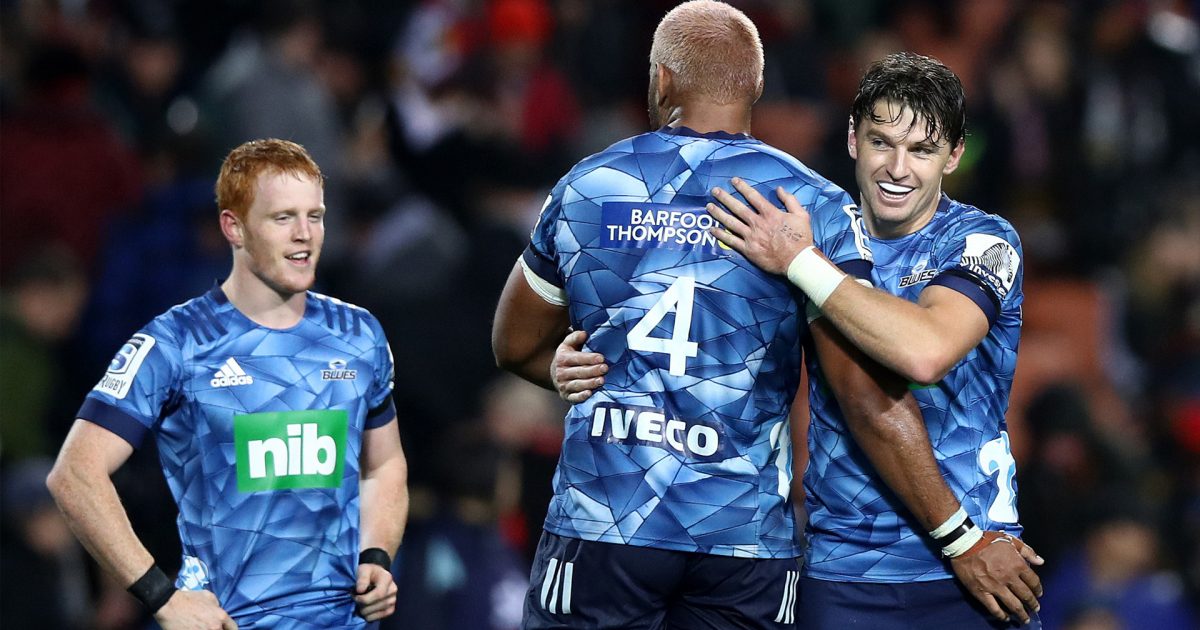Blues preparing for another year without a key piece of the puzzle

It can’t be easy supporting the Blues, knowing that your side is always just one or two personnel away from being at full-strength and nigh unstoppable.
Following the squad announcement for the 2022 season, Leon MacDonald was quick to affirm that the Blues won’t settle for second best. While this year’s Trans-Tasman title earned the franchise its first silverware since 2003, the magnitude of the success wasn’t quite the same as winning a properly robust competition like the upcoming Super Rugby Pacific.
“We still haven’t won a title with all the teams in it, that’s the key,” MacDonald said. “From start to finish, go through semi-finals and win it, that’s the goal.
“We’re clear that last year’s title was only half the season; we want to win the full season title. That’s going to be our driver.”
The Blues’ biggest competition will come from the Crusaders and Chiefs, who both finished ahead of the Trans-Tasman champions in the Aotearoa competition. While the Crusaders have managed to entice Argentina talisman Pablo Matera to Christchurch and the Chiefs have Brodie Retallick back on their books as well as former All Black Josh Ioane, both sides have also lost key personnel, including the likes of Tom Sanders, Whetukamokamo Douglas and Damian McKenzie.
The off-season has been similarly balanced for the Blues, with Roger Tuivasa-Sheck arriving from the NRL and the returning Beauden Barrett effectively swapping places with Patrick Tuipulotu, who will spend the season in Japan.
Barrett and Tuivasa-Sheck will undoubtedly add significantly to a backline that’s already bursting at the seams with talent.
The former will partner new All Black Finlay Christie in the halves while the latter is expected to slot in at No 12 and forge a formidable combination with Rieko Ioane.
That leaves Caleb Clarke, Mark Telea, Bryce Heem and Jacob Ratumaitavuki Kneepkens to fight it out for spots on the wings while Stephen Perofeta’s performances for Taranaki in this year’s NPC means incumbent fullback Zarn Sullivan won’t necessarily have a free ride into the No 15 jersey.
That still leaves experienced or promising talents such as Sam Nock, Harry Plummer, Tanielu Tele’a and AJ Lam to fight it out for spots in the reserves.
After a tumultuous year that saw him miss out on Olympic sevens selection and struggle to replicate his 2020 form, Caleb Clarke is set for a big season with the Blues. #SuperRugbyPacific #Blues https://t.co/ZNFdhiTn4N
— RugbyPass (@RugbyPass) November 23, 2021
And while the backline has likely reached its peak potential for the medium term, at least in terms of raw talent, there’s also plenty to like about the forwards.
The Blues have four All Blacks prop to pick between, a couple of experienced hooker options (as well as one seriously promising up-and-comer in the form of Soane Vikena) and a smorgasbord of talented loose forwards, including Akira Ioane, Dalton Papalii and Hoskins Sotutu.
It’s Tuipulotu’s one-year absence in the second row that will hurt the Auckland franchise, however, with Gerard Cowley-Tuioti also heading to Japan after finishing up with the Blues. Josh Goodhue is a solid Super Rugby option while Tom Robinson can also slot in if needed, and the recruitment of Luke Romano is a good piece of business from MacDonald – but the fact of the matter is that the Blues’ first-choice pairing from last season who started in the Trans-Tasman final have both flown the coop for 2021.
Ultimately, it means the Blues are still not quite where they’d optimally like to be, personnel-wise – which has been a recurring theme for the team over the past few seasons.
Prior to 2020, the Blues had perpetually been on the lookout for a test-level pivot and despite boasting backline talents such as Sonny Bill Williams, Ma’a Nonu and Ioane, they weren’t able to get the best out of their artillery.
Barrett’s recruitment ahead of the 2020 season was seen as a turning point for the franchise but the Blues’ new recruit missed the formative part of Super Rugby as part of his contract before linking up with the team for the first time ahead of the Aotearoa campaign.
This year, the franchise had to make do without Barrett again, with the playmaker in Japan on sabbatical, and while Otere Black filled the No 10 jersey admirably, the Maori All Blacks pivot is simply not on the same level as the former World Rugby Player of the Year. Caleb Clarke was also absent from the Trans-Tasman portion of the season.
Barrett’s permanent return to Auckland (at least for the next two seasons) means the squad will have arguably the best backline in the competition for 2022 – although the Crusaders may rightly attest that point – but Tuipulotu’s loss means the Blues are still not quite where they need to be, where they have all the pieces needed to really run amok.
It could well be that 2023, the year of the Rugby World Cup, is the season where it all really comes together for the Trans-Tasman champions. For now, however, they do have the cattle to challenge for Super Rugby Pacific glory, even if there are likely to be a few fans daydreaming about what could have been.











































































